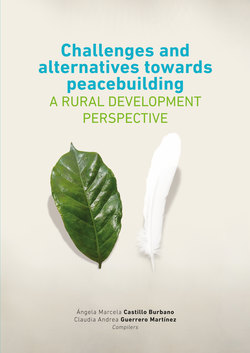Читать книгу Challenges and alternatives towards peacebuilding - Israel Biel Portero - Страница 3
На сайте Литреса книга снята с продажи.
ОглавлениеSummary
Rural development and peacebuilding in Colombia have been highly prioritized by higher education institutions since the signing of the Peace Agreement between the National Government and the FARC-EP. This has resulted in the need to further analyze rural strategies that contribute towards a better life for the population of territories where armed conflict is coming to an end, whilst understanding the pressing uncertainty that this process implies; on the one hand, for the urgency of generating rapid and concrete responses to social justice and equity, and on the other, because fulfilling the agreement guarantees scenarios of non-repetition of the war in the country.
These were some of the reflections that motivated the research project “Rural development alternatives for peacebuilding: educational strategies to strengthen the ability of producers and young people that contribute to the coffee production chain in the municipalities of Leiva, Policarpa and Los Andes of the department of Nariño, with international impact in the province of Carchi-Ecuador”. This work is presented as an investigative result that contains the analysis of theoretical and territorial dynamic contributions regarding the construction of peace, education and the economy for rural development.
The book is made up of three parts: Part 1 gathers sociological, legal and demographic works on the challenges of peacebuilding with the national and departmental context of Nariño, and looks at human rights from the perspective of population health and quality of life. Part 2 presents texts on the dynamics of rural education in Colombia; national challenges and lessons learned based on case studies of specific forms of education. Part 3 presents economic analyses regarding the models that are behind the conception of rural development and the productive and institutional dynamics of the local sphere for the generation of employment and income.
All three parts are relevant at both the national level and also the more specific area of the department of Nariño and within this, the Cordillera region. This area, historically affected by the armed conflict, despite experiencing continuing uncertainty regarding the resurgence of violence and the increase in illegal crops, has also reignited hope with regards to finding solutions to the problems seen in the countryside; through educational, community and productive experiments.
Although there are contradictory dynamics, the authors agree that the rural territory is a scene of permanent and collective construction, mediated by constant social struggles and power disputes with the State. It is therefore necessary to rethink the strategies for implementing the Peace Agreement in this region, with participatory scenarios being provided to include the rationale specific to rurality, such as: justice and reconciliation, social pedagogy, pertinence of study and student retention rates, social and solidarity economy, productive associativity, demographic conditions and health; including the physical, mental and social wellbeing of rural workers. With this work, we hope to reflect collectively with academics and human rights activists, spurring an increase in studies of rural areas and those analyses of community and innovative strategies that reinforce the road towards the construction of a lasting peace with social justice in Colombia.
Keywords: peacebuilding, human rights, rural development, rural education, rural economy.
